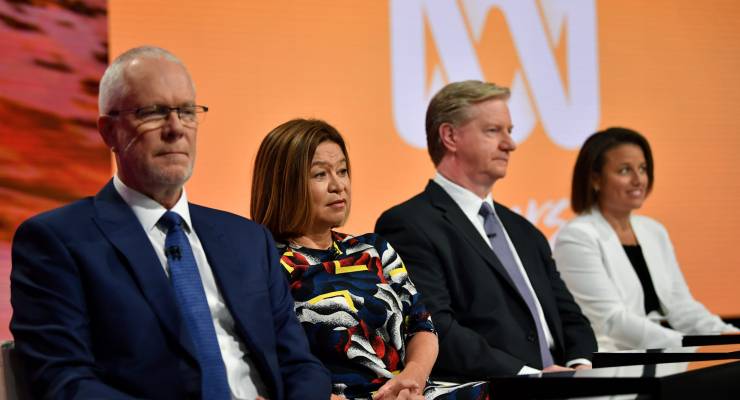
ABC Chairman Justin Milne, Managing Director Michelle Guthrie, Board Member Peter Lewis and Board Member Dr Kristin Ferguson
The ABC has used its first annual public meeting to push its place in Australia as the most popular and most trusted media outlet.
In a slick, stage-managed meeting broadcast at the ABC’s Sydney headquarters and simulcast at the studios in Rockhampton and Launceston, and online, chair Justin Milne and managing director Michelle Guthrie spoke of the challenges facing the media. They described the ABC’s strategy for working into the next 20 years as “ABC 2.0”. Milne and Guthrie, as well as chief financial officer Louise Higgins, emphasized the efficiency of the ABC and the value for money it offers.
“ABC 2.0 will use technology to transform the way we serve content to our audiences,” Milne said. “And it will change how our people operate, attracting the brightest creative and technical talent and making the ABC an even better place to work than it is today.”
Milne said ABC 2.0 was the major strategy initiative for the ABC, but that it would not replace radio and TV.
“It is akin to us deciding to go into the television business in 1955,” he said. “Just as then, it will require significant investment and possibly generate some controversy. Back then the media barons complained bitterly about the government funding a TV network — which they saw as competing with them. But we did go into TV, the commercial sector has made billions upon billions of dollars and the Australian public has been the winner because they have had media choice and a trusted, independent, ad-free voice that belongs to them.”
The message of the meeting was centred around the trust and popularity of the broadcaster, with Guthrie also referring to the need for adequate funding for the ABC to fulfill its charter responsibilities.
“We know we have the support of the Australian public. With a monthly reach of more than 80% of Australians, we are more popular than both the major political parties combined,” she said.
Higgins also outlined how the ABC is funded, saying the ABC’s funding has declined in real terms by 28% since 1986 and how its per capita funding is 34% lower than the average of other public broadcasters.
The meeting, hosted by News Breakfast host Michael Rowland, also included six of 350 pre-submitted audience questions to be answered by executives. The questions were decided by an independent research company, but touched on regular criticisms of the ABC: whether the ABC is biased; whether there will be more cuts to legacy news and current affairs programming such as those of last year; advertising for other programs on the ABC; and whether funding for rural and regional programming would continue.
All the answers stuck to the usual messaging: the ABC is adapting for the future and for the way its consumers are accessing products, it is committed to fair and accurate reporting, it is producing more and more Australian content.
Milne also announced a new “brand manifesto”: “ABC, Yours”, which he said was a reminder that the work the ABC does is for Australians. “We think it packs a real, big punch,” he said.








it was not a “meeting” Emily! ABC Chairman Justin Milne is telling abcnews that it was the first of many AGMs and we are in fact “shareholders” in a corporation .. he obviously thinks this makes sense. And how on earth does #ABCYours work as a new brand name? If I say the ABC is Yours, then it is not Mine. How much did we tax-paying citizens pay some dopey private contractor for this nonsense?
How much money & blow did it take for the marketing consultants to change Your ABC to ABC Yours?
Clearly, the first essential step in reviving the ABC is changing the Federal Govt.
The rot has set in way too far under the current lot.
Rudd at least tried (but failed) to de-politicize the board appointments. Hard to see where the current train wreck will end up. Very depressing.
I immediately thought ‘ABC, up Yours’. Apt under this Coalition government.
Paddy has it.
Bastards Out, bastards OUT!
The rural network of ABC news and ABC radio is about all that’s worth keeping, it’s still the only source of info in emergency/ disaster situations….. Do not tamper with it.
I’ve stopped using the ABC online content as its far to socially manipulative and opinionated, there has been a loss of credibility organisation wide as a result.
I wouldn’t choose to pay for most of the rest if I was given the option, but I wouldn’t pay for any commercial television or radio whatsoever.